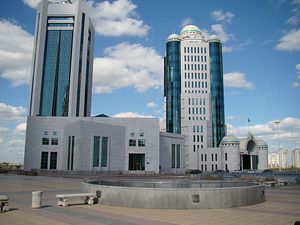Dunja Mijatović, the OSCE representative on freedom of the media, has joined an international chorus opposing a piece of Kazakh legislation that opponents say will place onerous limits on NGOs operating in the country. The draft law, approved by the lower chamber of the Kazakh parliament in late September was approved in the first reading by the Senate on October 8. It is unclear when a second reading is scheduled, but Mijatović urged the Kazakh Senate to “ carefully review the provisions of the bill, in close co-operation with civil society, in order to avoid its arbitrary application and ensure an enabling legal, regulatory and policy environment for NGO activities, including those working on free media matters.”
As Eurasianet succinctly summarized when the bill passed the lower chamber, “The law will establish a single state operator through which funding for NGOs must be channeled. Activists believe that will give the state a veto over which NGOs receive funding, and for what kind of activities.”
Mijatović pointed out in her statement that not only would the legislation channel grants through the government, the bill also “introduces possibilities for the government to limit the priorities of the NGOs and exclude freedom of the media from their area of work, it could pose a clear threat to free media in the country.”
In January, the U.S. mission to the OSCE commented on the law, saying that Kazakh efforts to facilitate state grant-making “can be taken as a sign of tangible support for the vital social and cultural work that NGOs perform,” but ultimately voiced concern over the lack of clarity in the law regarding private and foreign funding. “We urge the Government of Kazakhstan to clarify in the text that the new “Operator” mechanism would not apply to private and foreign funding of NGOs.”
The law in question has been in the works for a few years and many commentators have drawn comparison with the notorious “foreign agents” law introduced in Russia in 2012. The texts differ, but the intent is similar.
IWPR has covered the worrying array of new NGO laws in Kazakhstan. One such piece of legislation, passed last summer and put into effect in January, made a number of changes to the criminal code. While some of the changes were marked improvements–such as making it easier for pregnant women and minors to qualify for early release from jail–the legislation also expanded what kinds of offenses could be applied to NGOs:
For instance, leaders of NGOs and faith groups could face up to six years in jail if they fail to register their group with the state, receive funding while the group is still unregistered, or are deemed to have interfered with the operation of state institutions.
If adopted, some worry that the more recent NGO law could be used in combination with the updated criminal code to essentially shut down NGOs that are not decidedly pro-government. IWPR notes that critics of the law say it would favor “government-organised non-government organisation” Kazakhstan may be setting up the legislative infrastructure with which it can dismantle critical voices while allowing the semblance of civil society to remain.
The Astana Times, in December, published an article which depicted consultations between the government and NGOs on the law in a rosy fashion. The article comments that the creation of an “operator” would streamline the grant process, make it more efficient, transparent, and “be able to provide independent monitoring and supervision of the implementation of joint NGO-state projects, allowing more effective management and use of funds.”
But according to IWPR–in an article published the same day in December–despite early consultations between a committee of NGOs and the ministry behind the draft law “since then [early 2014], the ministry has fallen silent. Over the summer, the NGO committee wrote to it in the hope of reviving the dialogue, but it has not received a response.”

































